#but fr being in an all girls space is a different experience altogether
Text
Bonded with seniors and I'm so happy about it :')
#one of them apparently lives write across my room hehe#and she's also in queer club#:D#guys we had a girls hostel partyy#we played antakshari and ate pizza and drank cold drinks#and danced and talked#aaaahhhhh#but fr being in an all girls space is a different experience altogether#*right#I can't believe i made that typo
4 notes
·
View notes
Text
what is utahime’s role in the future? — a prediction (manga spoilers)
part 1 (unedited)
I WAS ABOUT TO POST IT BUT I ACCIDENTALLY DELETED IT AND I WAS SO HURT FR!!!!! I HAD REWRITE THIS ENTIRE THING </33
part 2 is here!
in this post, i will be analyzing the information we’ve been given about utahime so far to form a prediction about her future role in the jujutsu kaisen series. if you’re as interested in utahime’s character as i am, please feel free to keep reading :3 (i’ll also be talking about her relationship with gojo a bit too)

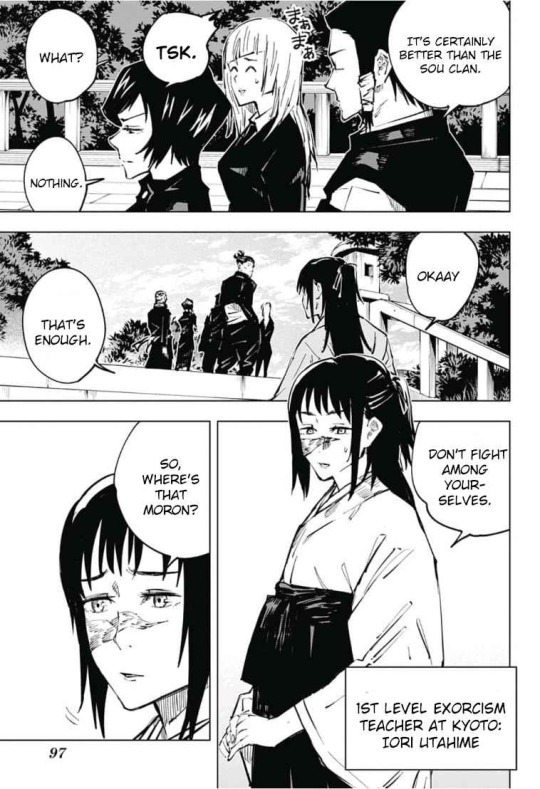
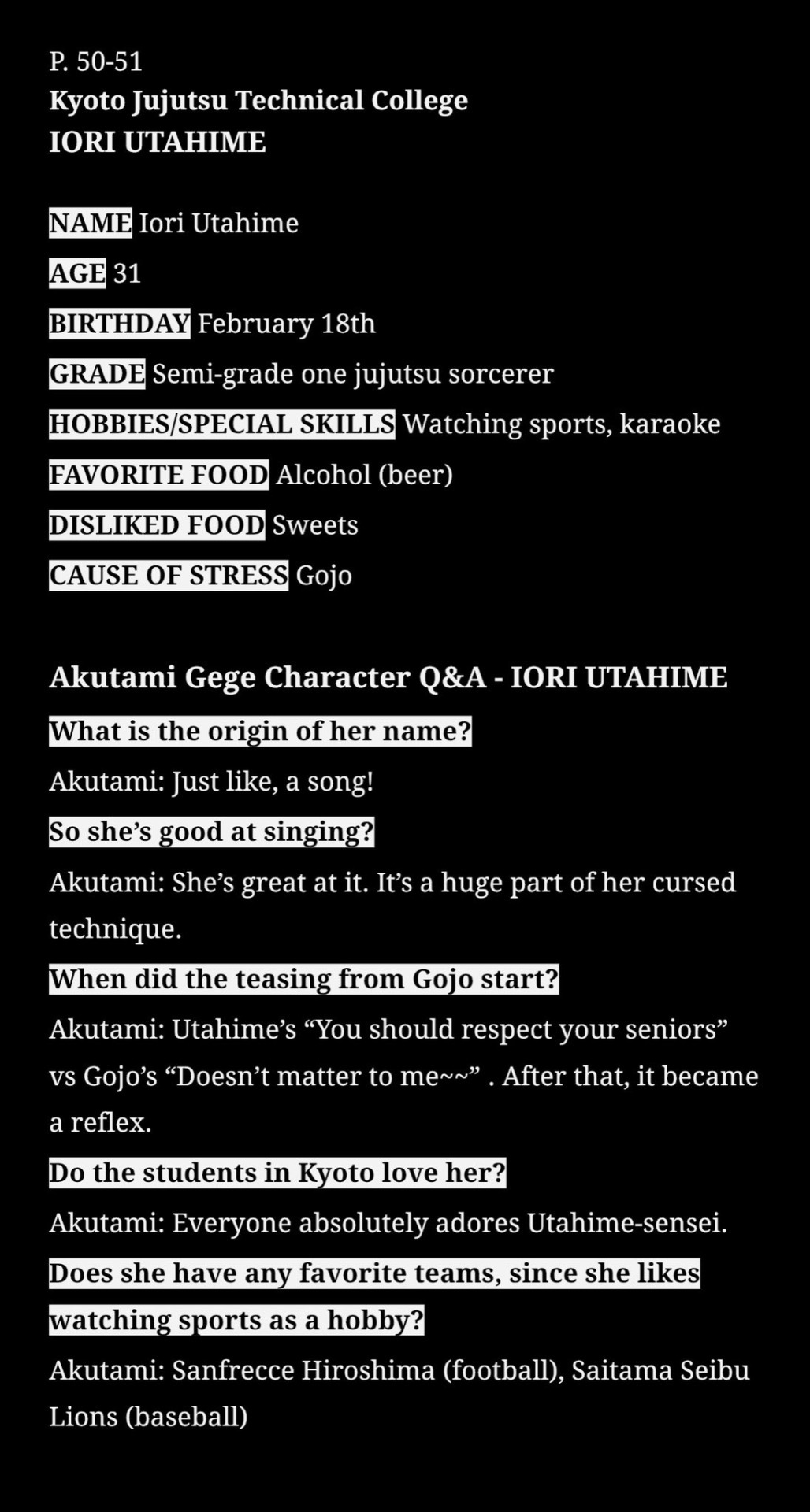
soukatsu_ on twt!

kaikaikitan on twt!
utahime iori is a semi-grade 1 sorcerer working as a student supervisor/teacher at kyoto jujutsu high school. she loves drinking beer and going to karaoke. she’s also close friends with shoko and she’s not particularly fond of gojo most of the time. what else do we know about her?
hates sweets (funny she’s the complete opposite of gojo)
she’s great at singing and it’s a huge part of her technique
squabbling with gojo became a reflex :3
everyone absolutely adores utahime
loves watching soccer and baseball
a terrible drunk (worse than naobito zenin)
gojo is her main source of stress
let’s dive into her personality and abilities!
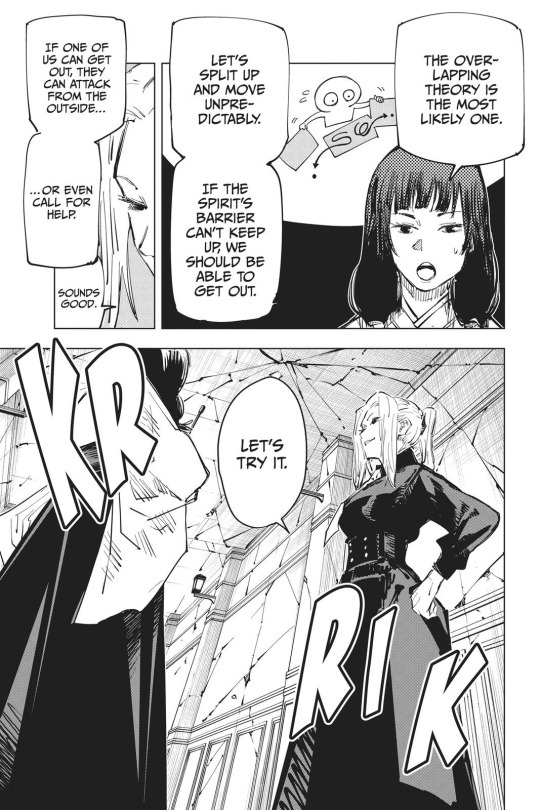
chapter 65
before i get into it, i think it’d be best if i were to explain the timeline because a lot of people seem to be confused about this one particular thing. utahime is born on february 18th, 1987. contrary to popular belief, she is not 3 years older than gojo. it is november 2018 in the story because gojo was sealed on halloween. if gojo was born on december 7th, 1989, that would mean that right now, he is only 28 years old. he has yet to turn 29.
the year is 2007. gojo satoru is a second year at tokyo jujutsu high school. the japanese school year begins in april which suggests that gojo is only 17 at the time (even if it’s not april, it doesn’t look like winter yet so it’s unlikely that he’s already 18). utahime is 20 because it is past february. she is a 2nd grade sorcerer at the age of 20. that’s not bad at all!
chapter 65 introduces young utahime and mei on a mission together within a cursed site. in real time, they’ve been gone for two days which is a cause of concern for gojo, shoko, and geto because the two haven’t contacted anyone since the beginning of their mission. the two begin to suspect something is wrong because the hallway markers they’ve set in place disappeared, and no matter how far they travel within the halls, the end is nowhere in sight. mei theorizes that the cursed spirit is overlapping the space as they travel forward. utahime agrees with this speculation and proposes a plan to escape the cursed spirit’s grasp by moving erratically. notice how she says that if one of them should escape, they can try to attack from the outside or call for help. if utahime was not capable of inflicting damage on anything then she would have told mei to escape and attack if she can while she waited to be rescued. however, she didn’t. she included herself in the sentence which leads me to believe that she is capable of going on the offense if needed.
keep in mind that at this point in time, mei is a grade 1 sorcerer. she is knowledgeable about all things involving jujutsu because she is experienced and skillful. we can see this aspect of her character illustrated when she theorizes that the cursed spirit is messing with the space they’re in. she chooses to go with utahime’s plan because she agrees that it’s the best action moving forward. this verifies that utahime is an intelligent girl that’s able to get along with pretty much anyone.
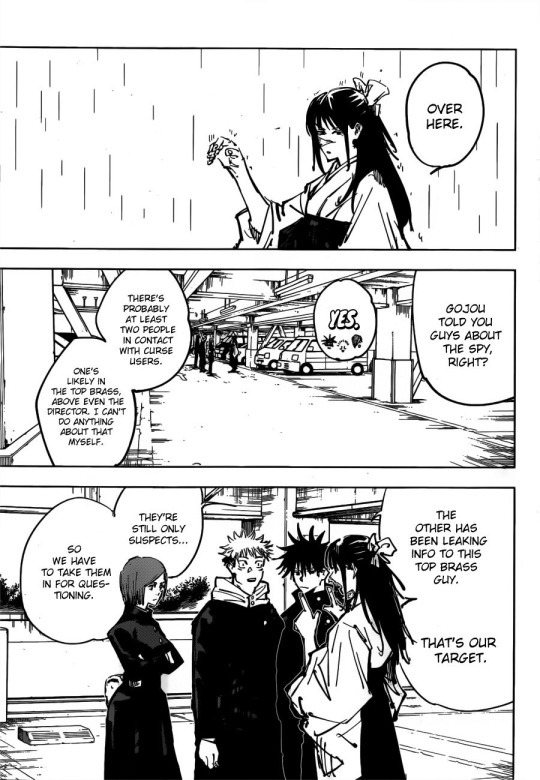
her intellect is demonstrated once again in chapter 79. she was able to deduce the possibility of there being more than one traitor and the fact that one is probably a higher up. she also narrowed down the mechamaru as the mole of kyoto not because he was acting suspicious but by process of elimination. she thought thoroughly of his technique and how easy it would be for him to manipulate devices small enough to be undetectable.
sure you can argue that she should already know all her students’ abilities and whatnot but you have to admit that it’s hard trying to sniff out the traitor when no one is acting suspicious. in addition to that, how did she know that there was a traitor in the top brass? i would have never guessed that tbh LOL (maybe bc im an idiot).
okay, now that we have established that she’s intelligent, let’s answer a more important question. is utahime weak?
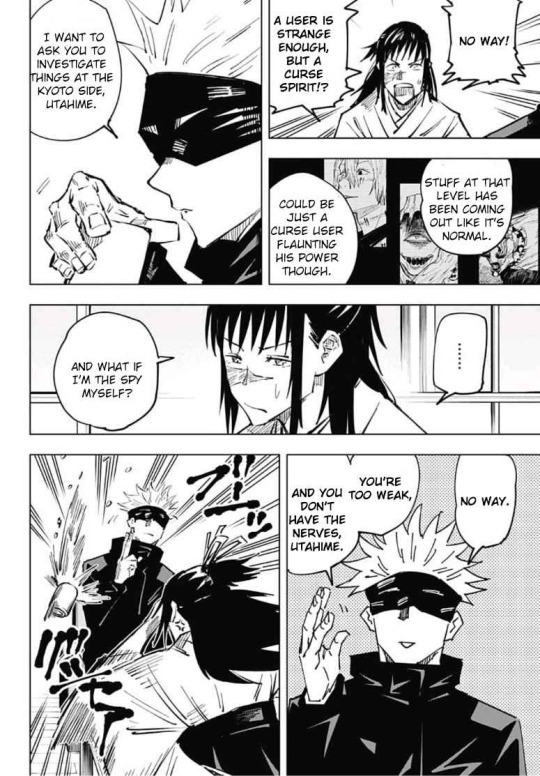
chapter 33
if gojo calls utahime weak, does that mean there is some truth to it? well it is true that she is weaker than him because he’s the strongest and all. in my opinion, he’s just teasing her. he probably found that calling her weak is what really riles her up. maybe i’ll talk about why he loves teasing her so much in a later post. but anyway, gojo calls everybody and their mom weak. he even said jogo was weak and we know how powerful that guy is. gojo’s words alone do not indicate much about utahime’s power. in fact, i don’t even think he has seen her use her technique yet. he’s probably only ever heard of how it works. this is what i think their conversation about her technique was like:
gojo: hm? ur cursed technique is singing? can u show me?
utahime: what! no way!
gojo: why not?
*one of the classmates tells him that she can only use her CT once in a while because it consumes a lot of energy*
gojo: hahaha! u have to conserve cursed energy to use ur CT? why are u so weak, utahime?
utahime: i! am! your! senpai! respect! me!
what i’m trying to say is that gojo loves poking fun of people. we should not believe him when he calls someone weak because compared to him, everyone is weak.
this is a little off topic but let’s examine him telling her, “and you don’t have the nerves, utahime.” i think he’s trying to say that there’s no way she’ll ever do something like that because she’s not the type to put her students in danger. remember the soft expression and relieved smile on her lips when she said that she was glad the students were safe after the kyoto incident? gojo was directly in front of her so not only did he hear her say that, but he could have seen the look on her face too. even if he told her that she didn’t have the guts to betray the school to get on her nerves, he knew that utahime simply cared too much about the students so he ruled her out as a suspect right away. this is why he ultimately decided to confide in her and ask her to help him.
i’m a person who loves over-analyzing things. i really enjoy the dynamic between gojo and utahime. they’ve known each other for more than 11 years and although they always bicker, there is an unspoken feeling of trust between the two. gojo can do anything and everything by himself because he is truly the strongest person alive, but he still knows when to rely on others. him deciding to entrust utahime with such a job implies that he believes in utahime’s abilities.
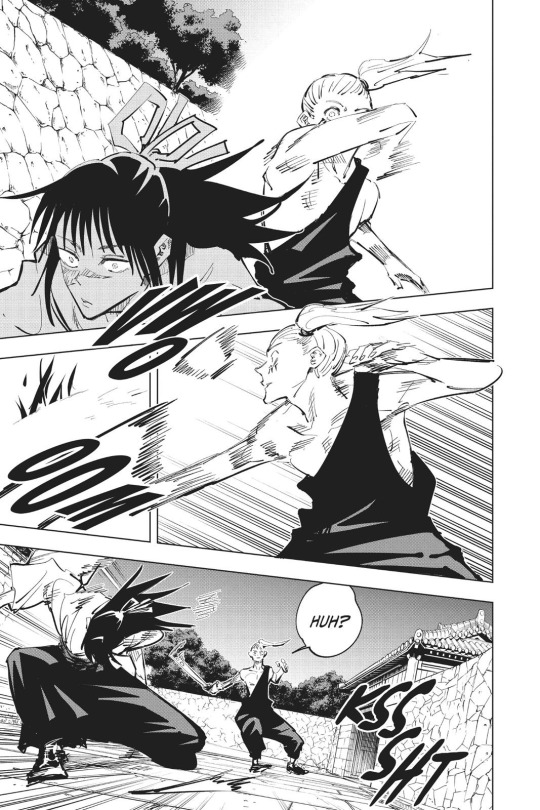
chapter 52
she’s not using any cursed energy here--not to our knowledge at least. this is just pure skill. she was able to swiftly evade the swing from haruta. he was surprised himself considering the fact that he was right behind her. how do we know her CT isn’t speed? after haruta swung at her, we can see that some of her hair got cut off. if she was using her CT then speed should be her specialty. she should have been able to completely avoid the attack altogether but she didn’t. of course this isn’t a wow moment because jujutsu sorcerers should know how to dodge attacks, however, i’m just trying to get the point across that she’s not a defenseless person without her technique or others. let’s not forget that semi-grade 1 isn’t a weak rank either. you can’t simply be recommended to be a grade 1 sorcerer if you only can support others.

chapter 48
i want to bring up this panel. it suggests that utahime and takuma are sorcerers who have not experienced black flash and therefore, do not understand the essence of cursed energy as well as those who have like gojo and nanami. i find it strange how takuma and utahime were used to represent sorcerers who haven’t experienced it yet. is the purpose to demonstrate that there is a clear difference in skill between adult sorcerers like utahime and takuma compared to gojo and nanami? i could be nitpicking but the order of todo’s statement doesn’t line up with the sorcerers being shown. let me explain in depth. todo starts off by saying, “for those who have experienced black flash as compared to those who have not...” wouldn’t it make more sense to show gojo and nanami on the right side to represent sorcerers who have experienced black flash? that was mentioned first, after all. gojo and nanami should appear when todo says “for those who have experience black flash” while utahime and takuma should be shown right after to personify the second part, “as compared to those who have not.” i’m just making it more complicated than it actually is LOLOL i’m sure it really just means they haven’t experienced black flash yet, which is completely fine. i also find it fascinating how they used utahime to contrast gojo. with nanami and takuma it makes sense. nanami is someone takuma looks up to, he wants to gain nanami’s approval before he deems himself worthy of a promotion. what about utahime and gojo? what’s the purpose of comparing those two together when it’s obvious that gojo knows more about the essence of cursed energy more than anyone else? i might be delusional whoops
----
let me know what you guys think? this is only a part 1 so i haven’t gotten around to answering the question. i’m pretty much done with the second part, i just need to revise it a little. i think after i post part 2, i’ll try to interpret all the gojo and utahime moments in the manga >.<
157 notes
·
View notes
Text
Yes, God, Yes
Full disclosure: I not only attended a Catholic high school, but I specifically attended a Kairos retreat, the exact retreat which the characters from 2020’s Yes, God, Yes attend. In the film, they call it “Kirkos,” but everything about “Kirkos” is the same as my (and seemingly every) Kairos. So let me clear up a few things for those of you who saw this film and thought, “This shit at this movie retreat can’t be what they do in real life.” Yes, Kairos leaders really do collect your phone and watch upon arrival to the retreat center since you are now on “God’s time ”(kairos comes from the Greek word καιρός which literally means “God’s time”). Yes, you are forced into small groups with your other classmates and feel this weird pressure to have a sad life story to share. Yes, small group leaders start to play music while they tell their own story AND pass out the lyrics as if these song lyrics are real deep poetry. One of my retreat leaders, for example, handed out sheets of the lyrics to Florence + The Machine’s “Shake it Off.” Now, I LIKE Florence + The Machine, but even still the lyrics to that song are nothing special. And, most of all, yes, those who come back from Kairos do tend to act a little cultish. At our school it was referred to as having a “Kai high,” a feeling in time when everyone just wants to be friends yet those people only exclusively hang out with one another.
In defense of Kairos retreats, at their very best, they offer adolescents at a critical time in their development the opportunity to reflect on their lives thus far, evaluate if they are living out the values their parents and community have instilled in them, and give them a safe space to work through conflicts, apologize, and try to be better people. At their worst, it’s a self-congratulatory experience where people act morally superior to others without really doing anything substantial… or even worse it’s a period of time where adolescents might unearth and talk about really hard topics like suicide, depression, etc. for the first time… and yet are given no real guidance on how to handle those emotions outside of this four day experience!
All this said, this is not a review of Kairos retreat. It is, indeed, a film review. I just wanted to make clear my biases etc. before talking about it since the retreat does more than provide the setting for the majority of Yes, God, Yes: the retreat’s four-day thematic structure doubles as the film’s plot structure. Just as in real life, our protagonist does a lot of questioning about her life and her faith during her first day, does some “crying” during the second as people, “accepting/trusting” the third, and then “living out” the lessons she learned on the fourth day and beyond! The difference is that in real life, teens are supposed to do these things in regard to their faith... or protagonist across those four days has a genuine sexual awakening.
In fact it’s exactly the desire to suppress her sexuality that prompts our protagonist to go on the retreat in the first place. Because our protagonist, Alice (played by Stranger Things’ Natalia Dyer), has just discovered something about herself that is hard to put out of her mind: she likes sex! Or, more specifically, likes masturbating. Alice is, from what we can tell in the prologue, a pretty by-the-books Catholic teen. She follows the rules, goes to Church with her Dad every Sunday, and os pretty sexually naïve… sheltered as we used to describe kids. Someone starts a rumor that Alice “tossed” a boy’s “salad” at a party and the rumor spreads like wildfire. Even the teachers know about it, and she loses her status as a gift bearer for the school’s weekly Mass. Of course, Alice doesn’t even know what “tossing salad” means (nor truthfully did I… but the movie seems to anticipate this by providing a definition to the audience at the very beginning of the film.)
All Alice knows is that she likes arm hair… like LIKES arm hair, something she discovers when she’s on an AOL chat room and someone sends her porn. That’s right, this is a film set in the early ‘00s, so if you hold any nostalgia for that time, get ready to have your fill from the era’s cheesy pop ballads to giant brick phones, to the fact that America (while starting to be so) wasn’t so health conscious that’s it not crazy to believe a teenage girl would just come home from school and snack on frosting and a giant bowl of Cheetoh’s Puffs. The nostalgia is not quite as in your face as in Captain Marvel, but it’s certainly more of a focus than it was in Lady Bird.
Yeah, you knew the comparison was coming. Let’s just be clear, this is by no means trying to be the next Lady Bird. This movie knows it’s pretty frivolous to begin with. Still, it’s hard to avoid comparison with the last big movie about a Catholic girl coming of age in the early 2000s. What I learned in watching this movie compared to Lady Bird or even Boyhood is that merely recreating aspects of my former life does not a good movie make. While I loved the fact that part of watching Lady Bird was getting to see someone shine a light on how ridiculous high school theater could be, that was never the point of the movie. Here, meanwhile, a significant purpose of the film is to highlight the fact that, yes, Kairos retreats are weird and the Church sucks. While I found myself nodding my head in agreement with what I was seeing on screen… it wasn’t exactly enjoyment as much as thinking, “yup, this is what a Kairos retreat is.” Furthermore, I feel like there are aspects of Kairos that would be great for skewering and I love the parts they absolutely nail: the cultish nature of the retreat and the pressure to frame your life in a sad way… but they ultimately take a route of criticism that is too easy and frankly is not a focus of most Kairos retreats… the focus on shaming one’s sexuality and the innate hypocrisy that behavior inevitably reveals.
If there’s a villain in this film, it’s probably the retreat leader and school priest Fr. Murphy (Timothy Simons), who gives in to rumors of Alice’s sexual impropriety as much as any schoolyard bully. No one in this whole film, from Fr. Murphy, to the head of Alice’s bunkhouse, to her small group leader, to even her best friend, takes Alice’s spiritual journey seriously, as they all assume Alice is not taking the retreat seriously as she seems to be avoiding talking about her recent, rumorous activity. Of course, there’s a bit of #MeToo hypocrisy here in that the male with whom Alice is said to have been engaged with enjoys none of the backlash that she has been dealing with. And to that degree it’s a satisfying movie in that Alice gets to dish out a little #MeToo revenge.
Still, even with all things conspiring against her, Alice retains her good spirit throughout the film… as well as her determination to further explore her sexuality. On the one hand, it’s a little unrealistic the risks she takes in trying to learn more about her body, but on the other hand teenagers and young adults are friggin’ weird when it comes to figuring out themselves. Ultimately she is emboldened in this take once she finds out that all those people who are out to get her to confess her “sins” are sinners in much the same way.
Probably the best scene comes at the end of Alice’s third day of the retreat when she runs away from the retreat center and walks into a lesbian bar where she hears the story of someone who used to be Catholic and is now not. More important than anything she could learn at the retreat, this Iowa girl learns that some normal people… just don’t have a religion. For some people this world, its pleasures, its pains, is more than enough. Alice doesn’t become a full-blown hedonist after this, but she is opened up to realize there’s more to life than Catholic guilt.
Perhaps to make this good message ring out, the film as a whole, despite some absurdist elements, feels like it’s meant to be a somewhat accurate reflection of reality. I wish the writer/director, Karen Maine had tried for a slightly more absurdist approach or taken out the absurdity altogether. She already makes the Catholic high school authority more caricature than character, and the plot at timesis almost silly. Therefore, the tone of the movie just sorta feels off throughout. Just about the only thing keeping this movie grounded is a great performance by Dyer who portrays a genuine sexual awakening very faithfully, capturing the mix of confusion, guilt, and excitement all at once. Even when Alice does something downright stupid, Dyer’s performance engenders our trust from the start, and we are always on her side. I wish I could have liked this movie more as it really does accurately portray some aspects of a Kairos retreat and is about as close as I think I’ll get to having it portrayed in a major film, but ultimately by not treating the Church authority with the same amount of nuance paid to Dyer’s Alice and her sexual awakening, the film ends up being an enjoyable, if one-noted, experience. Come to make fun of Catholics, stay for Dyer’s performance.
**7/8 (Two and seven-eighths out of four stars)
8 notes
·
View notes